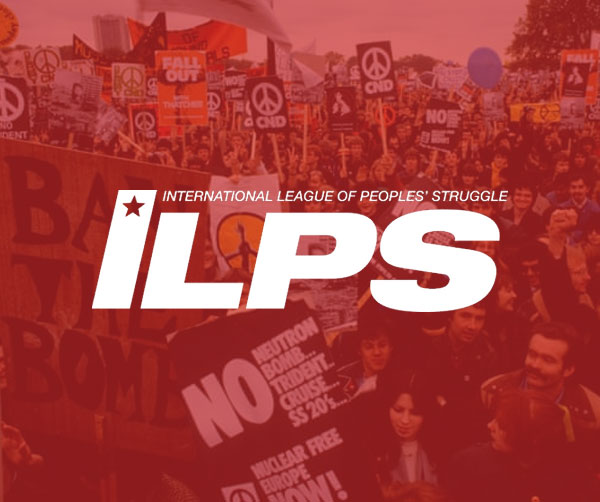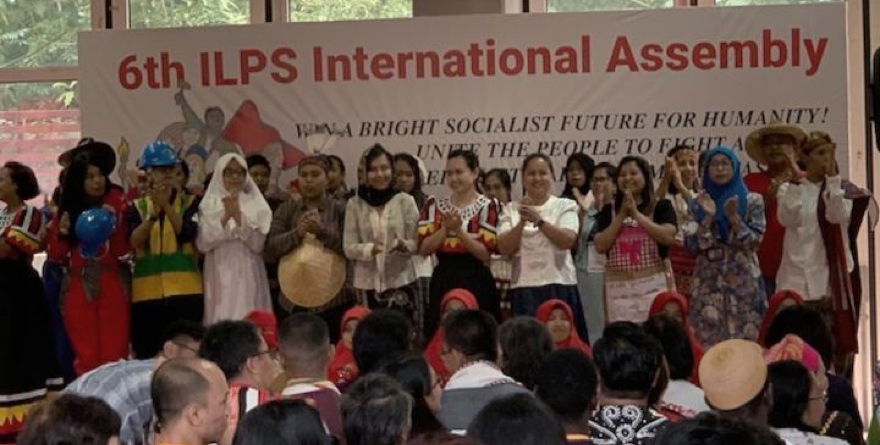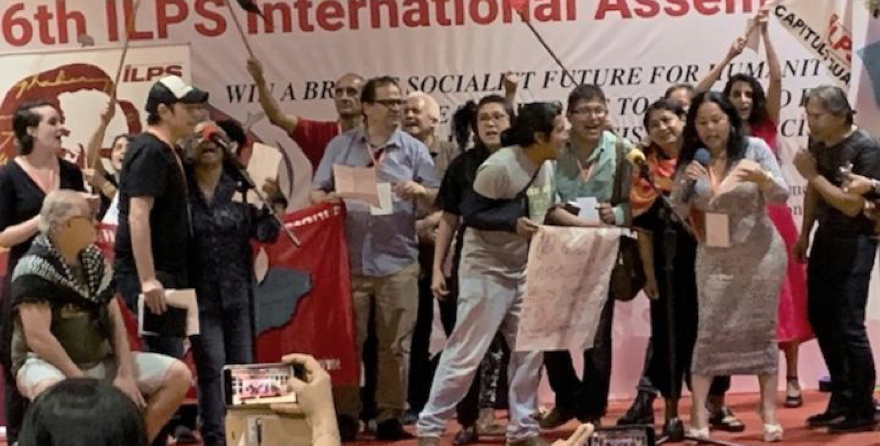Concern No. 2: Socio-economic development for oppressed and exploited countries and nations, and social equity for all working people
The deep problems of the imperialist-dominated world capitalist system have worsened and are in very sharp focus today. The majority of humanity has long suffered unremitting poverty and exploitation. But the people are being pushed into even greater difficulties by the current episode of intense economic and financial crisis which is feared to be the worst since the Great Depression of the 1930s. The current descent into greater socioeconomic turmoil doesn’t just underscore the inevitability of crisis under capitalism – it also exposes how imperialism’s dogged and vicious efforts to secure profits are precisely what create the conditions for ever greater instability. All this affirms how there can never be true socioeconomic development or equity for the people under this oppressive and exploitative capitalist system.
The global capitalist system has seen a generalized growth slowdown in the nearly four decades since the early 1970s. The relatively high finance and speculation-driven growth of recent years hasn’t been able to reverse this trend and is anyway short-lived and unsustainable. The masses are further and further away from the false promises of prosperity through neoliberal “globalization”. The number of those living on a conservative $2 (PPP) or less a day has doubled in the last three decades and reached 2.8 billion people or nearly half the world’s population. A billion people go hungry everyday and two billion do not even have clean water.
The current explosion of crisis appears to begin from financial excesses in the United States (US) leading to domestic troubles with subsequent repercussions on the rest of the world. Yet while the sub-prime loan crisis in the US housing market was the most immediate trigger, this merely reflects the system-wide problem with world capitalism of an unprecedented reliance on paper profits and digitally conjured capital. There are initial estimates that financial losses could reach at least US$30 trillion worldwide.
In its effort to maintain its profits, monopoly capital forced greater trade and investment liberalization on the neocolonies to exploit their cheap neocolonial labor, to plunder their raw materials, and to capture their markets. But these been less and less effectual and so it has relied more and more on paper profits and digitally conjured capital. The financial crisis manifesting first of all in the US merely exposes world capitalism’s system-wide problem of an unprecedented reliance on this largely fictitious capital. At the root of all this is capitalism’s basic intractable crisis of overproduction exacerbated in the last decades by the imperialist “globalization” offensive.
The people are also now severely burdened by rapidly increasing food and energy prices. Neoliberal “globalization” of agricultural production and trade has destroyed backward rural food systems and depleted food supplies aside from worsening poverty of agricultural producers. Subsidized food imports flooded domestic markets at the same time as producers were ever more tied to overpriced inputs from big foreign agri-business. The giant transnational oil corporations have used their monopoly control to drive prices up, which has even been exacerbated by speculation in oil futures markets. Rising energy prices have driven food prices up even further.
Imperialist “globalization” thoroughly exposed
Imperialism has become increasingly aggressive in seeking to relieve its crisis and maintain its superprofits. The intensification of the global crisis in the 1970s and the severe profit squeeze on the advanced capitalist powers drove them to seek deeper in-roads into neocolonial markets through their “globalization” offensive.
Backward agricultural systems were overrun and vast numbers of the peasantry thrown into greater hardship. At the same time there were more vicious attacks on labor even in the advanced capitalist countries. This economic assault continues to press down wages, salaries and benefits across the globe while political assaults pummeled unions and other organized workers in systematic trade union repression. Usurious debt burdens have also been used to directly extract surpluses from the neocolonies on a massive scale. Neocolonial external debt has already reached US$3.4 trillion as of 2007.
The 1980s and 1990s saw the expansion of global labor markets for capitalism to exploit. In particular the opening up of China, the former Soviet Union, Eastern Europe and the greater openness of various Southeast and South Asian economies effectively doubled the number of people for exploitation. Imperialism tapped these hundreds of millions both through setting up investment enclaves overseas as well as by directly bringing in migrant labor or exploiting displaced refugees. Social services and public utilities were turned into sinister opportunities for profit.
However the limits of these wide-scale efforts to supporting capitalists’ profits and deepen misery on a global scale, were quickly reached. The economic dispossession of large swaths of humanity further constricted opportunities for investments which in turn further accentuated the glut of finance capital. By the 1990s imperialism increasingly relied on getting its profits from purely financial schemes disconnected from any productive activity. Parasitic capital took advantage of advances in information and communications technology not just to facilitate its global production networks but also to fashion complex financial instruments for creating profits outside of any actual productive activity.
Previously unseen levels of profits were made from sheer speculation. But while seemingly increasing the capital stock these huge amounts of capital existed only digitally and were greatly diverging from real economic values. The economic impact upon massive financial losses are however very real. Imperialism sought to surmount its crisis with a bewildering array of financial instruments that are innovative only in creating unprecedented debt- and speculation-driven illusions of prosperity and growth. Global financial assets have bloated sixteen-fold from US$12 trillion in 1980 to US$190 trillion in 2007, over a third of which are in the US. Superconductive finance capital destabilizes economies of entire regions at a time and there were a record US$8.2 trillion in cross-border capital flows in 2006.
The self-limiting and destructive nature of this conjured economic dynamic was however soon exposed. The constriction of global markets continued and could not for long be compensated by increasingly debt-driven and unavoidably shallow growth in construction, real estate, commercial trading and finance sectors. Real economies are dragged violently down when financial crises erupt.
Peoples’ resistance
Hundreds of millions of the people across the imperialist countries and in the neocolonies have risen up to expose and resist imperialism’s economic aggression. The ranks of the oppressed working people that are mobilizing have broadened and prevented imperialism and neocolonial governments from easily pushing through with their plundering agenda. This strengthens the ability of the people to face the great challenges in the struggle against the oppression and exploitation intrinsic to capitalism.
Since the Second International Assembly, peoples’ movements have been advancing and waging successful struggles against imperialist “globalization”. The ILPS and its organizations have been among those at the forefront especially of the most important struggles and in many cases have been their leading formations. Among the peoples’ major achievements in recent years have been contributing to the paralysis of the World Trade Organization (WTO) including through massive protests against its 6th ministerial in Hong Kong, the discrediting of the International Monetary Fund (IMF) and World Bank (WB) and exposing its burdensome debt offensive against the peoples of Africa, and the scores of peasant struggles against the distorting of agriculture in the countryside of neocolonies in South and Southeast Asia.
Challenges continuing
Imperialism’s international mechanisms for the domination of world trade, investment and economic life continue to set global rules and distort national economies. They establish exploitative economic relations between advanced capitalist powers and neocolonies. The international finance institutions of the WB, IMF and other regional banks are thoroughly discredited but remain influential. Even if the talks at the WTO remain stalled it remains imperialism’s most potentially expansive mechanism for pushing its plundering agenda. And particularly important in the last few years are the bilateral and regional free trade agreements (FTAs) that the US, European Union (EU) and Japan are using to tighten their domination of individual countries and regions. There were some 340 FTAs in various stages of talks in mid-2007 from just a few dozen in the early 1990s. If need be the opening up of economies has even been enforced through sheer military coercion and aggression.
In the neocolonies and other dependent nations these are done with the compliance of increasingly subservient governments. They craft the domestic economic regimes most favorable for imperialism and its need for profitable opportunities and outlets for its capital. They maneuver to deliver labor and natural resources to imperialism at the cheapest possible price. They wield state force to stifle peoples’ resistance and to try and make the masses docile and submissive.
General resolutions
The majority of humanity is chronically deprived with generation upon generation going through lifetimes of hunger and destitution. The world’s working people have less and less options for decent living, they are losing jobs and livelihoods, and their incomes are collapsing on a massive scale. Some 1.5 billion people do not have or are otherwise lacking jobs in 2007 – the 190 million unemployed and 1.3 billion so-called “working poor”. Farmers, workers, indigenous communities, especially women and children, are driven into deeper misery. It is urgent for the people to achieve socioeconomic development, social equity and justice.
We people of the exploited countries and nations reaffirm our commitment to confront imperialist systems of plunder, exploitation and oppression. We assert our sovereignty and independence. All grossly unequal imperialist trade and investment deals and policies must be outright rejected. We shall begin to build alternative international relations of cooperation and solidarity between peoples. Our efforts to build more progressive and democratic economies will be all the more effective the more peoples there are working together on a regional and global scale.
Our domestic economies must be built where our countries’ natural resources and our peoples’ labors serve the needs of the masses most of all. This means a socioeconomic program serving and thus wholeheartedly supported by the people. This shall redistribute wealth to peasants and workers and other basic sectors, beginning with true agrarian reform and development that breaks feudal backwardness in the world’s vast countryside. There must be genuine national industrialization. The people’s basic and vital needs for education, health and housing must be assured. We will take approaches as appropriate depending on the sizes, resources and economic strengths of our economies.
We shall chart a humane, equitable and just path that does not exploit other peoples and economies and that is ecologically sound. Here the masses will be decisively in control of their lives, as well as at the center of building just and peaceful societies. The need to continue building and strengthening democratic mass movements is as urgent and vital as ever as well as underpins our movements for national liberation. The accelerating economic deterioration points in the direction of an upsurge in social and revolutionary movements worldwide.
Specific resolutions
The peoples’ struggle for socioeconomic development against imperialism is integral to our overall struggle for national liberation, democracy and social liberation. We resolve to operationalize the Commission towards being able to:
-
Launch coordinated global and national campaigns to restore national food systems ravaged by “globalization” and address deepening rural poverty, to confront global oil monopolies and profiteering, and to tackle the excesses of monopoly banks and financial institutions.
-
Launch, coordinate or otherwise support anti-imperialist struggles by social and mass movements against neoliberal “globalization” and in particular against the WB, IMF, WTO and the increasingly aggressive FTAs as well as link with other movements in a broad campaign against imperialist globalization.
-
Further deepen international peoples’ solidarity and strengthen coordination among social movements in launching anti-imperialist struggles on socioeconomic issues. Build a broad anti-imperialist front on peoples’ socioeconomic issues in particular confronting plundering imperialist economic deals.
-
Launch, coordinate or otherwise support national campaigns and struggles by social and mass movements for the defense of jobs and livelihoods, increases in incomes and benefits, and securing social services and welfare services.
-
Launch a global campaign for genuine development cooperation premised on solidarity among peoples and equality, mutual cooperation and benefit among countries, involving the mobilization of solidarity, financial and other support from anti-imperialist groups in industrialized countries to those in the neocolonies.
-
Fulfill the Commission’s study objectives: exchange experiences and knowledge on international, national and theoretical political economic issues as well as on the features of each of our social systems; share information on specific socioeconomic struggles in our different countries; continually monitor maneuvering by imperialism and neocolonial governments in the economic field.
-
Propose, discuss, coordinate and implement, as necessary, Commission action plans for research, advocacy, campaigns, forums and conferences. Among others this includes developing and maintaining a website to support the Commission’s work.



